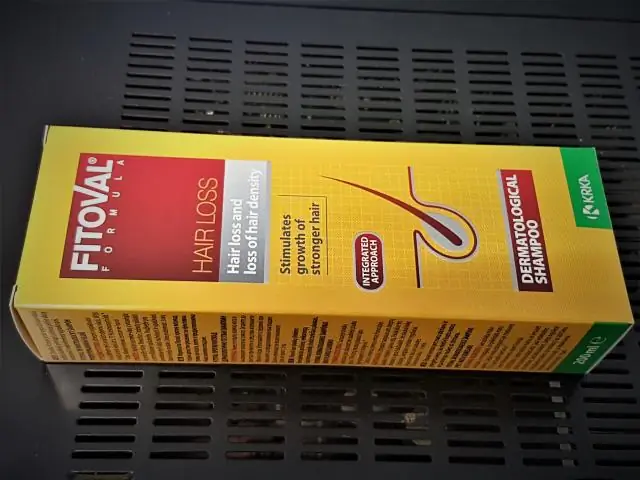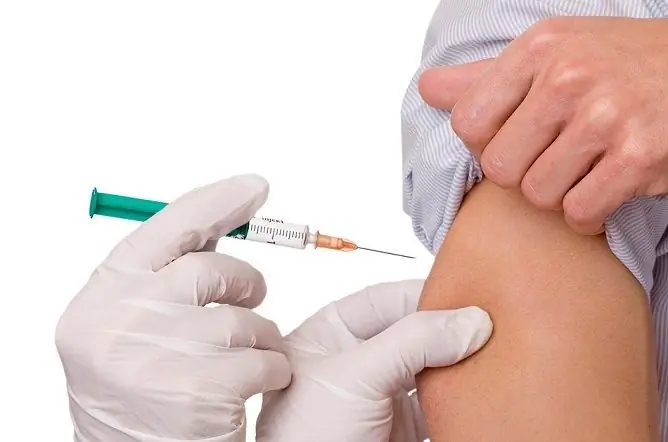- Author Rachel Wainwright wainwright@abchealthonline.com.
- Public 2024-01-15 19:51.
- Last modified 2025-11-02 20:14.
Vaccination against pneumonia: indications for adults and children, side effects
The content of the article:
- What is pneumococcus
- When you need a pneumonia vaccine
-
Vaccinations against pneumonia, which are given in polyclinics
- Polysaccharide vaccines
- Polysaccharide conjugate vaccines
- Features of the use of the vaccine against pneumonia
- Side effects and consequences
- Contraindications
- How effective is vaccination
- Video
Vaccination against pneumonia makes it possible to protect against pneumococcal infection, which in most cases causes inflammation in the lungs. These bacteria belong to the genus streptococci. Science knows about 90 varieties of these microorganisms, but 23 serotypes become the cause of diseases.

Pneumococcal vaccine helps protect against pneumococcal infections, including pneumonia
The first vaccination against pneumococcal infection was carried out in 1983. Given the fact that there are a large number of serotypes of the bacterium, multivalent vaccines (protecting against several types of infection) are being developed.
What is pneumococcus
Pneumococcus (Streptococcus pneumoniae) is classified as conditionally pathogenic bacteria. They can be found in the respiratory tract of most people, while the person remains completely healthy. But with a decrease in immunity, the infection can intensify and cause the development of not only pneumonia, but also endocarditis, arthritis, sinusitis or sepsis.

Streptococcus pneumoniae can cause many diseases
When pneumococcus enters the body, the immune system begins to produce antibodies, which are subsequently in the blood and, if necessary, begin to fight the infection. This is the basis of the principle of action of the pneumonia vaccine.
When you need a pneumonia vaccine
Vaccination against pneumonia is carried out for children under 6 years of age. It is believed that the body of an adult is able to cope with the infection itself. But in some cases, the vaccine is needed not only for the child.
The indication for vaccination against pneumococcal infection in adults is:
- the presence of chronic pathologies of the respiratory tract: chronic obstructive pulmonary disease, bronchial asthma;
- diabetes;
- advanced age (over 65);
- immunodeficiency states;
- smoking more than one pack of cigarettes a day;
- cirrhosis of the liver;
- surgery to remove the spleen;
- congenital malformation of the neural tube.
Vaccinations against pneumonia, which are given in polyclinics
Today there are two types of pneumococcal vaccines:
- polysaccharide;
- polysaccharide conjugated.
Vaccination against pneumococcus is included in the vaccination schedule. It can be done for free for a child, but it is not mandatory. It is used only if the baby has pathologies of the respiratory system, and he is prone to frequent colds, such as ARVI or flu.
Polysaccharide vaccines
Polysaccharide vaccines contain a set of polysaccharides contained in the bacteria capsule. After the introduction of the drug, the body begins to produce antibodies to them, and when faced with pneumococcus, activity against the pathogen is immediately manifested.
The disadvantage of these drugs is that the immune response they induce is rather weak, and the immunological memory is short-lived. Polysaccharides, which are used to make vaccines, are T-independent antigens, so there is no T-lymphocyte response to them. After a short period of time after vaccination, the body stops responding to pneumococci.
These vaccines are not used for children under two years of age because they are not effective enough. For the prevention of the disease, polysaccharide conjugate vaccines are used.
Polysaccharide vaccines include:
| Vaccine name | Description |
| Pneumo 23 | The manufacturer of this vaccine is the famous French company Sanofi Pasteur. The preparation contains polysaccharides of 23 most dangerous serotypes. In an adult, after vaccination, immunity to pneumococcal infection persists for 5 years. The drug is not used to vaccinate children under 2 years of age |
| Pneumovax 23 | The vaccine is produced by the American company Merck Sharp & Dohme Corp. As well as Pneumo 23, it contains polysaccharides of 23 pneumococcal serotypes. It is used to vaccinate adults and children over 2 years old. |
Polysaccharide conjugate vaccines
This type of pneumonia vaccine was developed after polysaccharide vaccines were found to work for a limited period of time and were not very effective in children. An adjuvant was added to the drug, which is a substance that enhances the immune response.
The effect of polysaccharide conjugate vaccines is slightly different. They contain polysaccharides from the pneumococcal capsule, which combine with the CRM197 protein. This substance plays the role of an adjuvant. It is synthesized from diphtheria toxin, replacing one amino acid with another. The substance is safe for humans, and its concentration in vaccines is minimal.
Due to the fact that T-lymphocytes actively react, the body acquires a long-term immunological memory. These vaccines are used for adults and children under two years of age. Vaccination in childhood makes it possible to reduce the number of diseases caused by pneumococcal infection and in adults in contact with children.
There are several such vaccines on the market:
| Vaccine name | Description |
| Prevenar 13 | The vaccine is produced by the Russian company NPO Petrovax Pharm, while the developer of the drug is the American pharmaceutical company Pfizer. The drug contains 7 pneumococcal capsular polysaccharides and a conjugated protein. It is used to vaccinate children from 2 months and adults. In order to develop immunity to pneumococcal infection, the drug is administered to adults once |
| Synflorix | The vaccine is manufactured by the Belgian pharmaceutical company GlaxoSmithKline. The product contains polysaccharides of 10 serotypes conjugated with a protein (diphtheria, tetanus). Most often, the drug is used to vaccinate children under 2 years of age, but in some cases it is also used in adults |
Features of the use of the vaccine against pneumonia
Pneumococcal vaccines can be combined with other vaccines. The drugs must be injected into different parts of the body and not mixed in one syringe.
Preliminary, the preparation is visually checked for the presence of foreign particles. During storage, it can stratify into a transparent liquid and sediment, therefore, before use, it is shaken until a homogeneous suspension is formed.

Before administration, the vaccine must be checked for foreign particles.
Dispose of vaccine residues according to local regulations. Within 30 minutes after vaccination, a person should be under the supervision of medical personnel in order to exclude the development of anaphylactic shock, which in rare cases occurs in people with hypersensitivity to the components of the drug.
Side effects and consequences
In most cases, patients tolerate the vaccine well, without consequences. Side effects in adults are much less common than in children. Most often, they manifest themselves as:
- redness, induration, and swelling at the injection site. Some patients experienced severe pain at the injection site. Limb movement limitation may also occur;
- myalgia, arthralgia;
- an allergic reaction in the form of urticaria;
- short-term increase in body temperature up to 39 ° C;
- diarrhea, vomiting, lack of appetite;
- headache;
- tiredness and chills;
- hypersensitivity reactions in the form of facial edema, bronchospasm or shortness of breath.
Contraindications
It is necessary to refuse vaccination in the following cases:
- acute period of an infectious disease or exacerbation of a chronic disease;
- the presence of hypersensitivity to the components of the drug;
- pregnancy and lactation.
How effective is vaccination
There are no vaccines that represent 100% protection against pneumococcal bacteria, since there are a huge number of serotypes of these microorganisms. But a person develops immunity to the most active and dangerous representatives of this family of bacteria.

Vaccination is recommended for elderly patients, the choice of the drug is made by the doctor
There is no guarantee that the vaccinated person will not get pneumococcal infection (pneumonia, meningitis or otitis media), but at the same time, the risk of developing these diseases is significantly reduced, since it is these bacteria that are the main causative agents of these pathologies.
Also, vaccination reduces the likelihood that, against the background of other infections (fungal, bacterial or viral), pneumococcal infection will occur and complications will arise, which is very important for people with reduced immunity.
It is not recommended to choose a vaccine for such a dangerous disease as pneumonia on your own. In order to choose an effective and safe remedy, you need to see a doctor.
Video
We offer for viewing a video on the topic of the article.

Anna Kozlova Medical journalist About the author
Education: Rostov State Medical University, specialty "General Medicine".
Found a mistake in the text? Select it and press Ctrl + Enter.






